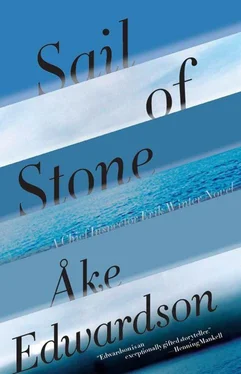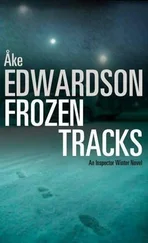“It doesn’t?”
Osvald shook his head.
“But don’t they have to go together?” said Winter.
“What do you mean?”
“Well, the church is so important here. It’s everywhere.”
“Mmhmm.”
Winter didn’t know if Osvald would say anything more. But he knew that this was important. Religion was an important subject here.
“No one from here thinks that it’s strange to go to church if you go into a foreign harbor in a storm, for instance,” said Osvald after a bit. “No fisherman from the west coast would hesitate to.”
Winter nodded.
“All fishermen from the west coast believe in God,” said Osvald.
“Does that mean there’s a God-fearing atmosphere on board?” asked Winter.
“All of us fear God,” said Osvald.
“And no one does anything evil on board?” said Winter.
Osvald didn’t answer.
“No one swears on board a fishing boat,” said Johanna Osvald as they sat in her house. Her brother nodded. It had grown dark. Winter was going to take the Skarven back to Saltholmen at 7:02.
“Not even when they slam their fingers in something?” said Winter.
“Not even then,” said Erik Osvald. “I have to say that you really react if you hear someone swear on the radio or something. If it happens, it must be fishermen from the east coast or Denmark.”
“Do you have a lot to do with Denmark?”
“We bring our fish on land in Denmark,” said Osvald. “In Hanstholm in Jutland. It’s on the west side of Jammer Bay. Across from Hirtshals.”
“West of Blokhus?” asked Winter.
“Exactly. Blokhus is farther into the bay.”
Blokhus was familiar to Winter. Several years ago he’d found some of the answers in a case he’d worked on there. A murdered woman couldn’t be identified, and the old clues had led him to Denmark and Jammer Bay. There the past had cast its long shadows into the future, which was the present.
“The Magdalena is never here in the Donsö harbor,” said Osvald.
“No?”
“No, no, she’s just here for an overhaul now. Usually we change off in Hanstholm.”
Osvald explained. The routine went like this: The Magdalena was out for six days fishing for cod and haddock and went into Hanstholm on the seventh day at five in the morning with the fish cleaned, “gutted,” as he said, weighed and sorted and packaged in six different sizes for the cod and four for the haddock. Fifteen to twenty tons of fish. The fish auction took place at seven, the same time all along the North Sea and North Atlantic. During the morning, the four of them worked on maintenance and taking supplies on board. The four relief shift workers came at noon and went right out with the Magdalena. The four who had been relieved got into the relief shift’s car and drove across Jutland to the ferry in Frederikshavn.
“What happens to the fish?” asked Winter.
“Fish and chips in Scotland,” said Osvald.
“Really?”
“The haddock should be just over minimum size, as it’s called. So the meat isn’t tough. And small cod can also become fish and chips. And it goes by truck on a ferry to Scotland. It’s a little strange, isn’t it? We sit off Scotland and catch fish that eventually go by truck to Scotland. There’s a ferry that goes directly from Hanstholm to Thurso, by the way.”
“I didn’t know that,” said Winter.
“It’s not much to know,” said Osvald.
Winter wasn’t sure he was right. There was something in what Osvald had said that Winter listened for. Something Winter didn’t understand then.
Later, when the wind started to become audible out there against the mess, Winter asked, “What’s the worst part about being out?”
“Well…,” said Osvald, looking at his sister. She hadn’t said much for the last half hour. But Winter knew that he would speak with her more.
“Well, the storms have never been able to break us, of course,” continued Osvald. “And not wrecks, injuries… nothing like that, ever. You just have to grit your teeth and you’ll get past it.”
“The silence,” said Johanna suddenly.
Her brother gave a start. Then he nodded.
“What silence?” asked Winter.
“The silence among the crew,” said Johanna. “Or what do you think, Erik?”
He nodded again but didn’t say anything. Suddenly it was as though he had become a part of the silence Johanna was talking about. As though he had suddenly become an example. He looked up.
“That can break you,” he said now. “Or, it does break you. Discord on board, a bad atmosphere. It breaks you fast.”
Winter nodded.
“Then you can easily end up alone as a skipper.”
“Sorry?”
“Then you can easily end up alone,” repeated Osvald.
“As a skipper?”
“As a skipper, yes.”
Winter thought about that. Erik Osvald was a skipper.
His young grandfather, John Osvald-had he also been a skipper?
“Was John Osvald the skipper on the Marino ?” he asked.
Osvald looked again at his sister, who didn’t look back.
“Not at first,” he said.
“Not at first? What do you mean by that?”
“Something happened one time… it was right before… I don’t know… but Grandpa was skipper when they sailed for Scotland.”
“Happened? What was it that happened?”
“No idea,” said Osvald.
“The ones who came home after the accident in Scotland. Didn’t they say what had happened?”
“We didn’t hear anything,” said Osvald.
“Did anyone ask?” said Winter.
“Yes,” answered Osvald, but Winter didn’t think it sounded convincing.
“But no answer?”
Osvald shrugged his shoulders slightly.
“It sounds almost like mutiny to my ears,” said Winter.
“We actually don’t know,” said Johanna as she followed him to the Skarven, which was on its way in from Vrångö. “Is it significant?”
“I don’t know,” said Winter. And significant in what way, he thought.
“Your father left the industry,” he said.
“But he was ready to retire anyway, as he put it. He was ready to be put in the Maritime Museum.”
“Which section?”
She smiled.
“But he can’t leave the sea entirely,” she said.
“How so?”
“He worries all the time. About those who are out at sea. About Erik and his crew. He listens to all the Danish weather too, and he starts at six in the morning and ends with the last report at quarter to eleven at night. But he never calls out to the boat.”
Winter noticed that she was speaking of her father in the present tense, as though he were sitting next to a radio right now and listening attentively to a monotonous voice repeating numbers, vital numbers.
“Where do they usually fish?” asked Winter.
“Oh, west of Stavanger, maybe, sixty or seventy nautical miles west. They sometimes come near the derricks, which are about fifty nautical miles east of Scotland.”
The Skarven docked at the Donsö pier with a soft thud. It would leave again in four minutes.
“Do you worry when Erik is out?” asked Winter.
“Naturally.”
Winter started to walk toward the boat.
“But now I’m worried about Dad,” she said.
“I will do what I can. We will.”
“Something has happened,” she said. “Something dangerous.”
“It would be good if you try to remember everything he said before he left. What he did. Who he talked to. If he wrote anything down and left it. If anyone called. If another letter came. Everything.”
“He prayed to God,” she said, looking at him. “My father always prays to God.” She nodded at the boat. “You should get on now.”
She gave him a quick hug.
Читать дальше












